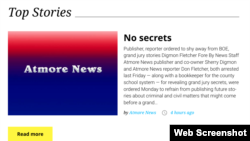A small-town Alabama newspaper publisher and a reporter were arrested last week for publishing an article that authorities said contained confidential grand jury evidence, a move that press freedom groups have condemned as unlawful.
Atmore News publisher and owner Sherry Digmon and reporter Don Fletcher were arrested on October 27 before being released several hours later on $10,000 bail each.
Their arrests followed the publication on October 25 of an article by Fletcher about an investigation into the local Board of Education’s alleged mishandling of COVID-19 relief funds.
“It’s incredibly concerning to see that a publisher and newspaper reporter were arrested for what seems to be in retaliation for an article that they published,” said Katherine Jacobsen, U.S. researcher at the Committee to Protect Journalists.
Ashley Fore, a bookkeeper in the school system, was also arrested for allegedly providing grand jury investigation information to the media, the local outlet WALA-TV reported.
The Escambia County Sheriff’s Office did not immediately reply to VOA’s request for comment.
Digmon, who is a member of the Board of Education, was arrested again on Wednesday on a separate charge of violating a state ethics law by allegedly using her position on the board to sell $2,500 worth of ads to the school system.
Digmon and Fletcher now face up to three years in prison if convicted of revealing grand jury proceedings, which is a felony in Alabama.
Fletcher and Digmon were placed under prior restraint as a condition of bail. Their attorney, Earnest White, did not reply to VOA’s phone message, but he told the U.S. Press Freedom Tracker that he advised his clients to not publish any more grand jury information to make sure the judge does not revoke their bail.
District Attorney Steve Billy, the prosecutor in both cases, did not return VOA’s phone message requesting comment for this story.
While it may be illegal to leak information, it’s not a crime for a news outlet to publish leaked materials, as long as the journalists obtained the information legally, according to press freedom experts.
“Journalists have protections so that they are able to publish this kind of leaked material. It’s par for the course. It’s how journalists operate,” Jacobsen told VOA.
“There is a lack of understanding and a lack of desire to understand the important role that journalists play, and that publishing material that perhaps is inconvenient is not the same as committing a crime. And conflating the two is incredibly concerning and ultimately very dangerous for reporters,” Jacobsen added.
The Atmore News did not return VOA’s phone message requesting comment.
The Alabama case resembles the raid in August of the Marion County Record in Kansas. Police claimed the newspaper had illegally obtained and published private records.
Press freedom groups widely condemned the raid as a violation of the First Amendment. The police chief who led the raid in Kansas resigned in October.
Both cases underscore challenges facing the local news industry in the United States, which has been wracked by financial woes for years.
While raids like the one at the Record are rare, other forms of suppression are more common, and local news outlets are less likely to have the resources to fight back.
“It’s really important for local authorities to kind of respect the role that journalists play in that community,” Jacobsen said.





